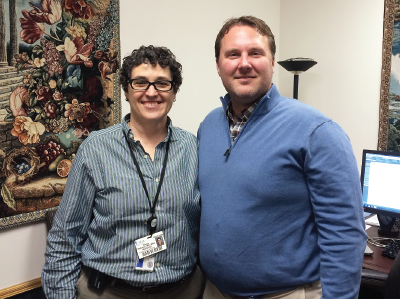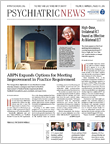Daena Petersen, M.D., M.P.H., M.A., chose the Medical University of South Carolina in Charleston (MUSC) for her residency because there was an opening to start an HIV psychiatry program.
Now a PGY-4 and an APA Public Psychiatry Fellow, Petersen earned a master’s in counseling and worked at a gay and lesbian health center in Los Angeles from 1987 to 1994 before she began medical school. So when she arrived at MUSC (after a year in a family medicine residency), she was asked to give a talk on the needs of gay and lesbian youth to pediatric endocrinologists at MUSC.
The endocrinologists were encountering an increasing number of young people who saw themselves as transgender and wanted psychiatry’s help in caring for them.
As a PGY-2, Petersen could not yet accept referrals, but those came a year later, effectively creating what is now a clinic for sexual minority adolescents and young adults, operating under the supervision of A. Lee Lewis, M.D., an assistant professor of psychiatry and child and adolescent fellowship program director.
“This is a great example of a young psychiatrist with the passion and drive to do important work,” Lewis told Psychiatric News.
The clinic is run though the general child and adolescent service, not simply as an LBGQT clinic. Lewis wants to see all the fellows who train there learn the nuances and subtleties of these patients.
“This is a population in great need of special care in terms of intensity, treatment planning, psychoeducation, and family training,” said Lewis in an interview. “All of those factors warranted having a clinic specifically designed to have more supervision, more time for the appointment, more flexibility in scheduling, and more interaction with other departments.”
Clinics like Petersen’s can play a valuable role in young patients’ lives, said New York psychiatrist Jack Drescher, M.D., training and supervising analyst at the William Alanson White Institute in New York City. “It’s a good thing that institutions like MUSC are fostering the growth of internal experts.”
At MUSC, the number of patients in the clinic has grown, especially as greater public attention has come to transgender individuals like Caitlyn Jenner.
Adolescence is a difficult time, but especially so for this cohort.
“These young people are distraught and conflicted,” said Petersen. “They feel their insides don’t match their outsides. It’s a traumatic time for some transgender individuals, especially during puberty.”
Established procedures exist for managing adults going through gender transition, but there are no standards yet for adolescents, said Lewis. “This clinic begins the process of understanding the reality of their insight into their gender and their development.”
More and more, Petersen sees her patients as fitting along a continuum. Some take hormones while others don’t but still identify and dress as transgender. Some opt for surgery, and others for partial surgery.
A small number have been investigating the process, are ready for the next step, and are seeking support. Others may still be uncertain, and it’s comforting to have a category to belong to, she said.
She often recommends that patients live for at least a year as the other gender and connect with a mental health professional for an evaluation to be sure they are not facing an identity or personality issue.
“I try to give them options as part of a process to figure out who they are and explore options in a safe way,” she said. “Young people need the opportunity to think one thing and then come to a different conclusion. All of this can be considered ‘transition,’ and it’s a very complicated process,” she said.
Drescher concurred.
“What happens in such clinics is frequently a cultural issue,” he said. “As with the role of culture in other clinical encounters, it is valuable to understand how being LGBQT affects clinical interactions.”
For instance, does the family know about the patient’s status? Should they be told at that moment? Who should do the telling? Even the pronoun by which the patient is referred can carry a cultural load, said Drescher.
“I’d really encourage families and young people exploring gender identity and sexual orientation to keep an open mind, to access support, to get services, and to be open enough to ask for what they need so that they can make a transition or accept themselves as they are,” said Petersen. “Letting the young person lead the process is really important, because we don’t have a lot of science to go on.” ■
The website of the Department of Psychiatry and Behavioral Sciences at the Medical University of South Carolina can be accessed
here.

